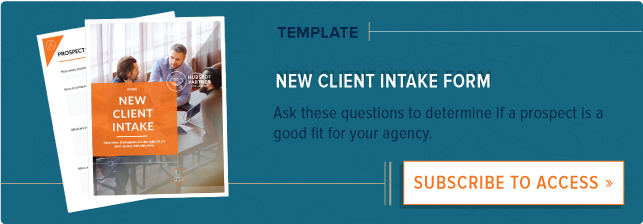
Establishing credibility isn’t just about asserting your intelligence or expertise.
Real credibility comes from a careful balance of trust, empathy, and good judgment. And it needs to be attentively nurtured throughout your client relationships.
To help you avoid unintentionally damaging your credibility, we’ve compiled a list of six seemingly harmless phrases that can undermine your credibility and communicate to the client that you aren’t fully on their team. Are you guilty of using any of these?
6 Phrases that Kill Your Credibility with Clients
1) “This tactic is guaranteed to boost your conversion rate by 60%.”
Avoid exaggerating or overselling the successes of your services — your clients can smell insincerity a mile away, and it’s sure to turn them off. Presenting them with inflated numbers or unrealistic claims won’t boost your credibility, it will make them question whether you can provide any honest value to their business.
Remember: there’s confidence, and then there’s just plain bragging. Your clients only care about your past successes in the context of how they can directly provide value now, so avoid reading off a laundry list of accomplishments or stats. It can come across as self-serving and out of touch with the client’s specific needs.
Even if you’re not overtly exaggerating, be sure to cut out lofty words like “guaranteed,” or “absolutely.” These can come across as deceptive and pushy, and fail to communicate what your agency can actually do.
Focus on explaining the genuine value of your agency’s services. If you highlight a few proven strengths, rather than a showy list of claims, your client will be more likely trust your expertise.
2) “Sorry I couldn’t get that to you by Wednesday — something came up.”
When your actions don’t align with your words, you end up falling into what Prasad Kaipa calls a “Credibility Gap.”
Avoiding the Credibility Gap starts with setting realistic expectations and time lines on projects, and keeping an open line of communication to alert your clients if anything goes wrong or takes an unexpected turn.
Kaipa explains to Harvard Business Review that the best way to set realistic expectations is to be more aware of what you’re promising. He recommends checking in with yourself regularly and asking, “Am I saying something that implies a promise? What are the odds I can or will actually follow through? How can I articulate my ideas and concerns in such a way as to not raise false expectations?”
If you realize too late that a deadline isn’t feasible, don’t freak out. It’s not unusual for unanticipated issues to arise during the course of a project, but as long as you remain transparent and clearly communicate the issues to your clients, your credibility isn’t likely to suffer.
3) “We call this marketing approach ‘Infrared Magical Marketing Synthesis,’ or IMMS.”
Credibility requires clear and accessible communication, and nothing undermines this more than an overuse of jargon or acronyms. Overcomplicated words and insider phrases don’t help you connect with your client — they create barriers.
People often unknowingly fall back on jargon when they want to sound clever or informed, but in reality, it can end up hurting your credibility much more than it helps.
When you rely too heavily on jargon to convey information, it can diminish the meaning of your message and cause unnecessary confusion. Even worse, it has the potential to isolate your client and make them feel like an outsider in your discussions. Using too much jargon can also come across as evasive — like you’re unwilling or incapable of giving clients a simple, straightforward answer.
Before meeting with a client, comb through your presentation and eliminate any jargon-heavy words or acronyms that don’t actively contribute to your message. Your clients will appreciate the directness of your communication style, and will likely be more receptive to what you have to say.
4) “Although the numbers look bad now, this tactic has actually worked for many of our other clients.”
Ignoring or glossing over factual evidence in favor of selective, anecdotal evidence isn’t just a rhetorical fallacy, it’s also a major credibility killer.
The client hired you because you have expertise they think can benefit their business, and that means admitting when an approach isn’t performing as well as planned and pivoting towards something with more potential. When you scrounge around for evidence that supports a not-so-great approach as a way to salvage it, you end up falling victim to confirmation bias.
Confirmation bias occurs when you interpret all evidence — even ambiguous or anecdotal evidence — as confirmation of your preexisting beliefs. This can cause you to problematically overlook alternative possibilities that could benefit the client more than the current approach. In other words, you get so focused on pushing a particular strategy that you fail to see any real evidence against it.
The best way to avoid confirmation bias and keep your credibility intact is to focus on new evidence as objectively as possible, and prove the value of your work through clear reporting. If you’re scrambling to justify a particular tactic, it’s might be time to let it go, rather than damage your credibility attempting to defend it.
5) “I just don’t think that approach is going to work.”
Anyone who’s ever worked in a people-facing role knows how challenging it can be to always see eye-to-eye with clients — especially when you feel like you’re caught in a cycle of endless revisions that never seem to make them happy. You want to make sure your professional opinion is properly asserted, but it’s important to know when to step back defer to your client’s judgment.
If you get in the habit of shooting down your client’s input or ideas, they’ll start to think you haven’t taken the time to fully consider their point of view. Pushing back without proper justification can make you seem reactive and unthoughtful — and that undermines your credibility.
One of the best ways to establish your expertise and make your client feel comfortable and respected is to know when you don’t have the best answer, and let your client make the final call.
6) “Does that make sense?”
This seemingly innocuous phrase has the potential to be so damaging to your credibility that Jerry Weissman, a leading corporate presentations coach, has written a whole article on it in Harvard Business Review.
When you follow up a presentation or assertion with, “Does that make sense?” it has two negative implications, according to Weissman:
Uncertainty on the part of the speaker about the accuracy or credibility of the content.
Doubt about the ability of the audience to comprehend or appreciate the content.
Not only does this phrase make it seem like you’re unsure what you’re talking about, it also calls into question the competence of your client — which isn’t a great way to build a positive relationship.
Weissman recommends a switch to “Do you have any questions?” to avoid the negative connotations of this phrase. It’s a simple switch that can save your credibility from taking a hit at your next client meeting.
What phrases do you avoid using with clients? Let us know in the comments.

![]()

